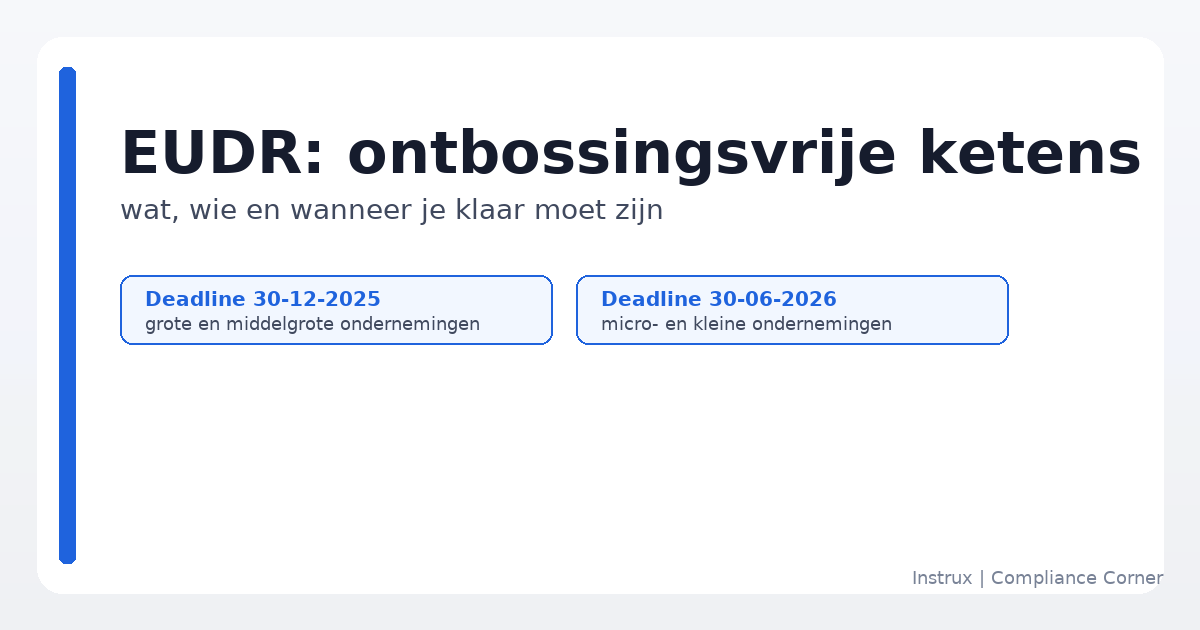EUDR: What does the new deforestation law mean for your chain?

EUDR: what does the new deforestation regulation mean for your chain?
The EU deforestation-free regulation (EUDR) is changing how companies source, track and report raw materials and products. The key is to be able to prove that your products are deforestation-free and legal, traceable to the parcel level. This requires clear processes, data quality and tight collaboration with suppliers.
What is EUDR
The EUDR is the European regulation to prevent products linked to deforestation or forest degradation from entering the EU market. The rules apply to a fixed set of raw materials and derived products, such as cattle, palm oil, soy, cocoa, coffee, natural rubber and timber. For these categories, you must collect information on origin, legality and geolocation, assess risks and – depending on your role – submit a due-diligence statement in the EU system.
For whom is the EUDR
Operator
This is the party that first introduces an EUDR product to the EU market or exports it from the EU. Operators perform full due diligence, including collecting plot coordinates, assessing and mitigating risks, and submitting the due diligence statement.
Trader (trader/distributor)
These are parties that resell EUDR products already on the EU market. Traders have minimum information and tracking obligations and – depending on company size – additional due diligence obligations.
EU factory/producer
Do you produce with EUDR raw materials and place the finished product first on the EU market? Then you are operator with full due diligence obligation.
When does the legislation go into effect
The obligations apply in phases. Large and medium-sized enterprises must comply as of Dec. 30, 2025. Micro and small enterprises are granted an extension until June 30, 2026. Please note that micro and small enterprises trading in wood and wood products do already fall under the rules as of December 30, 2025.
Medium-sized company: fewer than 250 employees and annual sales of up to €50 million or balance sheet total of up to €43 million
Microenterprise: fewer than 10 employees and annual turnover or balance sheet total of no more than €2 million
Small business: fewer than 50 employees and annual turnover or balance sheet total of no more than €10 million
What should a company actually do/have
Scope and product mapping
- Map which products and CN codes fall within scope.
- Identify all EUDR commodities and relevant derivatives in your portfolio.
Traceability down to the plot level
- Collect geolocations (coordinates) of plots where raw materials were produced or harvested.
- Link batches to plots and record chain steps (farmer → processor → trader → factory → market).
Due diligence process
- Collect mandatory information: legality, deforestation-free, geolocation, production date/origin, supply chain partners.
- Conduct a risk assessment by country/region/supplier.
- Mitigate risks with additional controls, audits, satellite monitoring or vendor switching.
- Document decisions and preserve evidence systematically.
Submission and file management
- As an operator, submit a due diligence statement to the EU Information System prior to market entry.
- Secure version control, reference IDs per shipment and retention periods.
Contractual assurance
- Capture EUDR requirements in procurement terms and SLAs (delivery of coordinates, legality proofs, data standards).
- Build in penalties and remedies for supplier non-compliance.
Organization, training and tooling
- Assign roles and responsibilities (procurement, logistics, QA, sustainability, legal).
- Train teams on data quality, chain mapping and risk assessment.
- Choose IT solutions for traceability, data validation and reporting.
Specific to traders
- Establish robust information and traceability records.
- Keep supplier and batch information and provide it to buyers as needed.
Quick start in 6 steps
- Create a product list with CN codes and highlight EUDR critical items.
- Ask vendors for plot coordinates and legality documents.
- Map the chain and determine where the first placement in the EU market occurs.
- Assess risks by origin and plan mitigation.
- Test a pilot submission in the EU information system and ensure archiving.
- Train teams, monitor compliance and review your risk assessment annually.
Ready for EUDR with Instrux
Want to be sure at once what your organization needs and how to set it up smartly? Instrux helps you from scope check and supplier briefing to due diligence, traceability and a trial submission to the EU system. We translate the requirements into workable processes, templates and clear responsibilities, so you can go live on time and with confidence. Schedule a no-obligation intake and receive a concrete roadmap with priorities, lead time and quick wins for your supply chain.